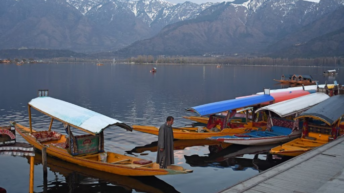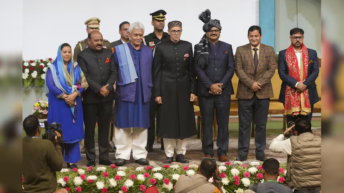|
Listen to article
Getting your Trinity Audio player ready...
|

Introduction:
The sanctity of democratic processes lies at the heart of a nation’s ability to chart its course towards growth and development. In the Indian context, General Elections hold paramount significance, serving as the bedrock upon which the nation’s future trajectory is decided. However, the spectre of foreign interference casts a long shadow, acting as an ‘invisible hand’ that seeks to manipulate electoral outcomes to further vested interests. This analytical paper delves into the nuances of this phenomenon, exploring how external actors attempt to sway Indian elections and the profound implications that hold for the country’s progress.
Understanding Foreign Interference in Elections:
Foreign interference in elections is a multifaceted concept encompassing a wide range of covert activities aimed at influencing the electoral process and sway public opinion. These activities may include cyberattacks on electoral infrastructure, disinformation campaigns, covert funding of political parties or candidates, and even direct intervention through espionage or other clandestine means.
The motivations behind such interference are diverse, ranging from geopolitical interests to economic gains or ideological agendas. Certain nations may seek to undermine India’s democratic institutions to destabilise the region and assert their dominance, while others may try to secure favourable trade agreements or access to strategic resources. Additionally, non-state actors, such as multinational corporations or ideologically driven groups, may also engage in interference efforts to further their objectives.
Modes of Interference:
1. Disinformation and Propaganda: The digital age has witnessed a proliferation of disinformation campaigns, where false or misleading information is disseminated through social media platforms, fake news websites, and other online channels. These campaigns often exploit existing societal fault lines, sowing discord and polarising public opinion. Foreign actors may employ sophisticated techniques, such as bots, troll farms, and targeted advertising, to amplify their narratives and influence voter behaviour.
2. Cyberattacks and Hacking: The integrity of electoral processes is heavily reliant on the security of digital infrastructure, including voter databases, electronic voting machines, and communication networks. Foreign actors may attempt to compromise these systems through cyberattacks, data breaches, or hacking attempts, with the goal of manipulating results, undermining public trust, or causing widespread disruption.
3. Covert Funding and Financial Influence: Foreign entities may seek to influence elections by channelling covert funding to political parties, candidates, or affiliated organisations. Such financial support can distort the playing field, providing certain actors with an unfair advantage in terms of campaign resources, advertising, and outreach efforts.
4. Espionage and Intelligence Operations: In some cases, foreign intelligence agencies engage in covert operations to gather sensitive information, blackmail or coerce key political figures, or even directly intervene in the electoral process. These activities can undermine the integrity of the democratic process and compromise national security.
Impact on India’s Growth and Development:
The ‘invisible hand’ of foreign interference in Indian elections has far-reaching consequences that extend beyond the immediate electoral outcome. It poses a significant threat to the nation’s growth and development on multiple fronts:
1. Erosion of Democratic Institutions: A cornerstone of India’s progress lies in the strength and resilience of its democratic institutions. Foreign interference seeks to undermine these very foundations, sowing distrust among citizens, polarising public discourse, and compromising the legitimacy of elected representatives. A weakened democratic framework hinders the effective implementation of policies and programs to sustainable development.
2. Political Instability and Policy Uncertainty: Elections tainted by foreign interference can lead to contested outcomes, prolonged legal battles, and political instability. Such turmoil creates an environment of uncertainty, deterring investment, hampering economic growth, and impeding the execution of critical development initiatives. Policy inconsistencies and frequent changes of government can further exacerbate this detrimental cycle.
3. National Security Threats: Foreign interference efforts often involve the acquisition of sensitive information or the exploitation of vulnerabilities within India’s security infrastructure. This jeopardises the nation’s ability to safeguard its interests, protect critical assets, and maintain regional stability – all of which are essential prerequisites for sustained growth and development.
4. Erosion of Public Trust: Widespread awareness of foreign interference can erode public trust in the democratic process, leading to disillusionment, apathy, and reduced participation in civic affairs. This disengagement can undermine the legitimacy of elected governments and hinder their ability to implement bold reforms and development agenda.
5. Geopolitical Implications: India’s emergence as a global economic powerhouse and its strategic location in the region make it a prime target for foreign interference efforts. A weakened democratic fabric and internal instability would undermine India’s influence on the global stage, limiting its ability to shape international discourse and secure favourable outcomes in areas such as trade, climate change negotiations, and regional cooperation.
Countering Foreign Interference: Strategies and Measures:
Safeguarding the integrity of India’s electoral processes and mitigating the impact of foreign interference is a multifaceted endeavour that requires a concerted effort from various stakeholders, including the government, civil society, the media, and the public.
1. Strengthening Cybersecurity and Digital Infrastructure: Investing in robust cybersecurity measures and fortifying digital infrastructure is crucial to protect against cyberattacks, data breaches, and other cyber-enabled threats. This includes enhancing the security of voter databases, electronic voting systems, and communication networks, as well as fostering collaboration between government agencies, the private sector, and international partners.
2. Combating Disinformation and Propaganda: Developing comprehensive strategies to counter disinformation campaigns is essential. This may involve strengthening fact-checking mechanisms, promoting media literacy among citizens, and fostering partnerships with social media platforms to detect and mitigate the spread of false or misleading information although that has the potential to curb the freedom of information and introduce political censorship.
3. Enhancing Transparency and Accountability: Promoting transparency in political financing and campaign contributions can help curb the influence of covert foreign funding. Robust disclosure requirements, independent oversight mechanisms, and stringent enforcement of existing regulations can create a more level playing field for all political actors.
4. Bolstering Intelligence and Counter-intelligence Capabilities: Enhancing India’s intelligence-gathering and counter-intelligence capabilities is essential to detect, monitor, and thwart foreign interference efforts, particularly those involving espionage or covert operations. This may entail strengthening inter-agency coordination, leveraging advanced technologies, and fostering international cooperation.
5. Promoting Civic Engagement and Media Literacy: Empowering citizens through civic education and media literacy programs can help inoculate the public against the effects of disinformation and propaganda. Encouraging active participation in the democratic process and fostering critical thinking skills can cultivate a more informed and resilient electorate, better equipped to identify and reject attempts at foreign interference.
6. Fostering International Collaboration and Consensus: Addressing foreign interference in elections requires a coordinated global effort. India should actively engage with international organisations, strategic partners, and like-minded nations to establish norms, share best practices, and develop multilateral frameworks to combat this threat to democracies worldwide.
Conclusion:
The ‘invisible hand’ of foreign interference in Indian General Elections poses a formidable challenge to the nation’s democratic integrity and aspirations for sustained growth and development. By exploiting vulnerabilities in digital infrastructure, disseminating disinformation, channelling covert funding, and carrying out clandestine operations, external actors attempt to manipulate electoral outcomes and undermine India’s progress.
Countering this threat requires a multi-pronged approach that involves strengthening cybersecurity measures, combating disinformation, promoting transparency and accountability, enhancing intelligence capabilities, fostering civic engagement, and cultivating international cooperation. Only by safeguarding the sanctity of its democratic processes can India ensure that its path toward growth and development remains unimpeded, guided by the will of its people rather than the machinations of foreign actors.
Ultimately, the resilience of India’s democracy and its ability to navigate the complex geopolitical landscape will determine the nation’s capacity to realise its full potential as a global economic and strategic powerhouse. By remaining vigilant and proactive in mitigating the ‘invisible hand’ of foreign interference, India can move forward on its path to progress, stability, and self-determination.






Add comment